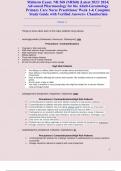Exam (elaborations)
Midterm Exam: NR 568 (NR568) |Latest 2023/ 2024| Advanced Pharmacology for the Adult-Gerontology Primary Care Nurse Practitioner Week 1-4| Complete Study Guide with Verified Answers- Chamberlain
- Course
- Institution
Midterm Exam: NR 568 (NR568) |Latest 2023/ 2024| Advanced Pharmacology for the Adult-Gerontology Primary Care Nurse Practitioner Week 1-4| Complete Study Guide with Verified Answers- Chamberlain Week 1 Things to know about each of the major antibiotic drug classes - Aminoglycosides (Gentamic...
[Show more]



